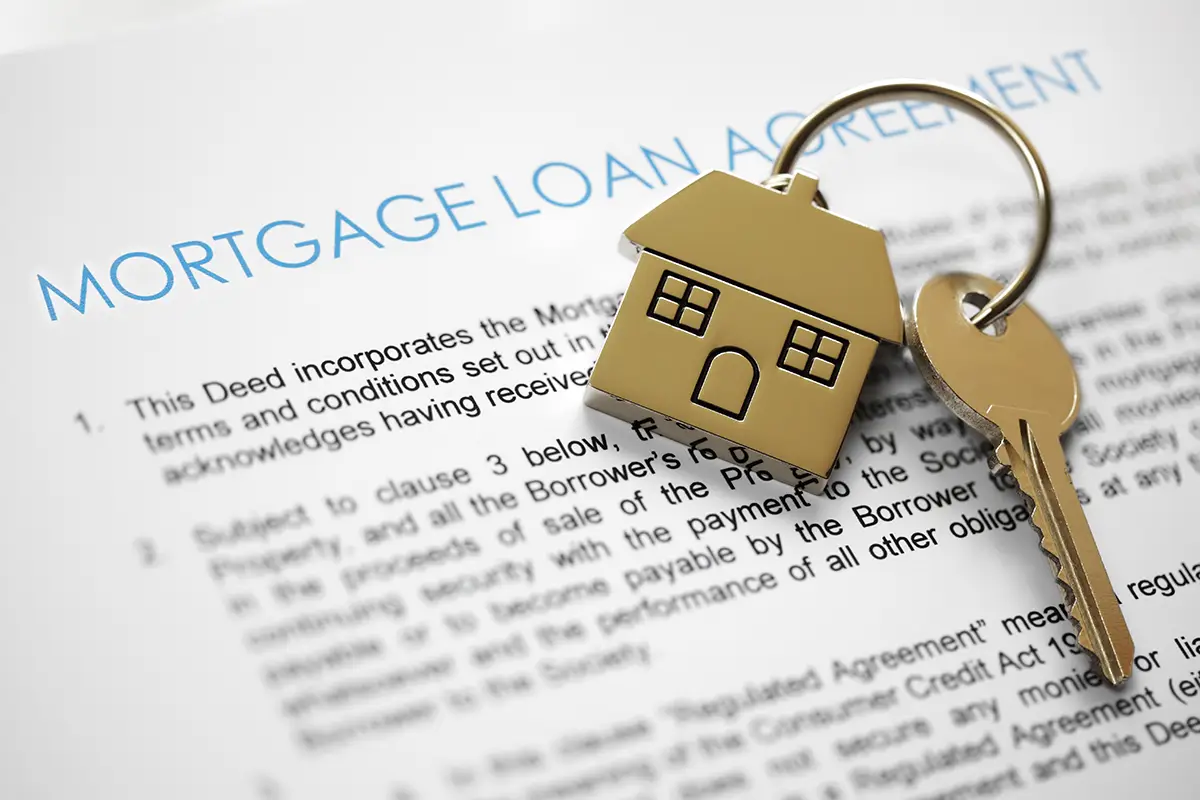
Looking to buy property in Portugal and need to know more about how mortgage rates work in the country? You’ve come to the right place. This article covers everything you need to know about taking out a loan and setting up your own mortgage in Portugal, including how banks set their pricing structures, the trending averages, rate types, and so much more.
Current Mortgage Interest Rates in Portugal
In Portugal, the mortgage interest rates have been on a steady downtrend since 2024. According to the latest information put out by Statistics Portugal, referring both to July and August 2025, the mortgage interest rates have decreased from:
- June 2025 – 3.479%
- July 2025 – 3.385%
- August 2025 – 3.307%
July fell 9.4 bps month-on-month. In August, it slipped a further 7.8 bps. That’s now 135.0 bps below the January 2024 high (4.657%).
However, the starkest difference is in regards to the new mortgage rates: from 2.951% in June, to 2.897% in July, and 2.883% in August.
The average monthly instalment on all contracts stayed at €394 in both July and August; with interest making up 51% of that payment and principal the remaining 49%.
With mortgage rates in Portugal decreasing, and new loans consistently pricing below the stock average, affordability continues to improve for buyers in 2025. If this trend continues, 2026 is set to be an even further compelling window to invest in property.
However, please notice that these are market averages, as Statistics Portugal uses an implicit rate – the average effective rate across all outstanding home loans (interest due this month divided by capital outstanding at the start).
Taking Out a Mortgage in Portugal in 2025
Mortgage rates work differently in Portugal than what you might be used to in your country.
All the major banks in Portugal offer what’s commonly called “Crédito à Habitação” - loosely translated as a home loan or a housing loan. This is the most common way to purchase a house in Portugal – with buyers turning to banks to finance their property investment.
Generally speaking, banks in Portugal do not finance 100% of the property purchase, since there’s too much risk involved.
Non-residents, or expats seeking to move to Portugal, can also apply for a housing loan to complete their own property acquisition – although the LTV (loan-to-value) is usually lower, with most banks willing to finance 60%-70% of the property investment.
The LTV determining factor will always be what’s lowest: either the purchase price or the bank appraisal value.
As a rule of thumb, the more of your own capital you put up front for your property purchase, the more favourable your mortgage rate will be.
Please be aware that, in Portugal, bank branches operate independently from one another, which means you may get a different quote from the same bank that’s completely tailored to you.
How Banks Price a Mortgage in Portugal
In Portugal, a variable mortgage rate is calculated by two sums:
- Spread – also called the Bank’s margin. This is the fixed percentage the bank charges you for granting the mortgage.
- Euribor – short for Euro Interbank Offered Rate. It’s the average interest rate at which major European banks lend money to one another in the Eurozone.
It’s a benchmark set for different terms: 1 week, 1, 3, 6 and 12 months.
The Euribor changes over time depending on the European Central Bank policies and conditions in the money market.
But there's more than one type of mortgage rates in Portugal. There's also: fixed and mixed.
Fixed, Mixed, or Variable Interest Rates: What’s the Difference?
Fixed Rate Mortgages
If the conditions align, you might be able to negotiate a fixed rate mortgage with your Portuguese bank.
Essentially, you’ll have the same rate throughout the entire duration of the contract, guarding you from whatever fluctuations Euribor goes through.
If you decide on early repayment, the bank typically charges 2,0% on the repaid capital.
Variable Rate Mortgages
With a variable mortgage rate, your monthly instalment will vary depending on whatever type of Euribor you chose.
Each 3, 6 or 12 month-period, your bank will revise your monthly instalment according to the Euribor rate.
Additionally, the bank will charge you 0.5% on the capital you’ve repaid if you decide to repay earlier. However, this amount is currently not being applied until the end of 2025.
Mixed Rate Mortgages
A mixed mortgage is, as the name suggests, a contract that combines both a fixed and a variable rate.
Usually, when contracting a house loan, a mixed rate means that it will remain fixed for a set period – how much depends on your personal situation, but a rough average is 5 years.
After that time has expired, it switches to variable.
Since late 2024 this has become the most common choice for new loans, according to Banco de Portugal analysis of new lending.

Mortgage Conditions: What Affects Your Personal Quote in Portugal?
Here’s a list of what you need to keep in mind that will affect the personal quotes you get from Portuguese banks.
- Residency Status: Non-residents are typically offered a lower LTV and a higher spread percentage. If you’re wanting to move to Portugal and buy a property, it’s best to also acquire residency.
- Market Conditions: Since Euribor is determined by the European Central Bank, the quote you may initially get may be different from the final one, since the current interest rates may be different from the one given to you during your application.
- Duration of the Loan: Non-residents are typically offered loans set with a maximum duration of 30 years.
- Willingness to Acquire Financial Products: Your bank might be able to lower your spread or offer a higher LTV if you subscribe to financial products, they might be able to reduce your spread. If you don’t, your interest rate is potentially going to be higher.
- Loan to Value: Banks size the loan on the lower of valuation or price. Usually, the more conservative LTV tends to have a better spread.
- Financial Situation: One of the many factors influencing the bank’s decision is an assessment of how much income you earn, your current debts, and employment history.
- Insurance: When you take out a mortgage loan with a Portuguese bank, you’ll also have to contract life insurance. It’s also common for banks to request home insurance as well.
Besides these considerations, you’ll also have to provide several documents for your mortgage application.
Documentation Required When Taking Out a Mortgage in Portugal
The following is not a static list, and not all banks will require all the documents, but keep in mind to have these nearby should they request them:
- Proof of ID – for non-residents, this will typically be a copy of your passport;
- Portuguese NIF Number – Portugal's Tax Identification number – mandatory for every major transaction in the country.
- Proof of Income;
- Bank Statements;
- Utility Bills - typically asked if you're already living in Portugal.
- Last year’s tax returns declaration;
- CPCV – Contrato de Promessa de Compra e Venda – the signed contract between buyer and seller agreeing to the purchase of the property.
As a non-resident, expect to also provide translated and apostilled documents. If you’re employed, you should also prepare the latest pay slips you have, including up to 6 months.
If you’re self-employed, you might also be asked to provide your own company’s balance sheet, as well as documentation pertaining to other sources of income.

Portuguese Mortgage Costs & Fees
When it comes to buying property in Portugal, there are always associated costs with the purchase. They are:
- Stamp Duty (IS): Typically, 0.8% of the purchase price.
- Property Transfer Tax (IMT): Rates vary based on property value and type.
- Notary and Registration Fees: For legalising the transaction.
There are also with specifically taking out a mortgage in Portugal.
- Stamp Duty: Typically 0.6% of the mortgage amount.
- Application fees: depends on bank.
- Property valuation fees: depends on the bank.
- Early Repayment Commission: By law this has been suspended on variable rate home loans until 31 December 2025, including full repayment when switching banks.
Step-by-Step Guide: How To Take a Mortgage in Portugal
- 1. Contact Portugal Homes: The first step in completing a successful property purchase starts here. We work directly with banks and with certified credit intermediaries to ensure you get the best possible deal.
- 2. Get your Portuguese NIF number and open a bank account in Portugal.
- 3. With Portugal Homes’ help, you’ll get a mortgage quote. Bear in mind that the market shifts, and the conditions provided to you in the quote might not be final.
- 4. Begin preparation by readying the documents the bank or credit institution might require from you. After you submit the necessary paperwork, you will receive a full quote mortgage with all the conditions.
- 5. The bank will set out a valuation report on the property. If the property’s value is determined to be at least the selling amount, there should be no issues in proceeding, provided there are no legal issues with the property.
- 6. After all the documentation is settled, it’s time to sign the deed. At this point, the institution that’s issuing the mortgage and lending you the money will pay it out directly to the property seller. Once everything is properly registered in the Notary, the property is officially yours.
Why Buy with Portugal Homes
Admittedly, one of the most difficult parts about moving to Portugal is the bureaucracy – which is already a headache by itself and becomes further complicated when you don’t understand Portuguese.
Not to mention, living in Portugal as an expat isn’t just about getting property. That’s just one step of the journey.
There’s also the visa part – which one suits your needs? And what about your family? Are they coming too?
That’s why Portugal Homes is proud to be a one-stop shop for all your relocation needs to Portugal.
As part of the broader Harland & Poston Group, we:
- Helped facilitate transactions in the +€500 million;
- Currently own +€180 million in assets;
- Have a 100% successful residency visa application rate;
- Have several projects in development – both in Portugal and the United Kingdom;
- Offer unmatched relocation & property services to take care of you throughout the entire journey.
Our team pairs your finance plan with the right partners and the right property - that fit your risk and timeline.
We coordinate valuation, documents, and deed so your completion stays on track until you own your property in Portugal.
Frequently Asked Questions about Mortgages in Portugal
1. What is the mortgage interest rate in Portugal right now?
The official implicit rate on all outstanding home loans stood at 3.385% in July 2025, while the average on new contracts recently signed was 2.897%.
These give a reliable picture of the market level, though your personal quote will depend on your personal profile and property you’ve chosen.
2. What are mortgage rates in Portugal for new loans?
A. Banco de Portugal series through Spring and early Summer 2025 place new housing loans near three percent on average, with April reported around 3.06% and June around 2.87%. Again, individual quotes differ by bank, term, and LTV.
3. Can foreigners take a mortgage in Portugal?
Yes, foreigners can get a mortgage in Portugal.
4. What is the maximum LTV for foreigners in Portugal?
For expats and non-residents, the maximum LTV is between 60% to 70%, though this amount is always dependent on your personal context.
5. What benefits do foreigners get when taking out a mortgage in Portugal?
Currently, with Euribor rates decreasing, the lending conditions are in the buyer's favour.
Portugal's lower cost of living, reflected also in the property market, when compared to other European countries, make it a more better choice for private investors.
6. Can retirees take out a mortgage in Portugal?
If you're already retired, you can still take a mortgage in Portugal if you have steady income from other sources, including pensions.
However, most banks will not offer mortgages if you're above a certain age threshold.
7. Why do my quotes differ from the averages?
Because lenders add a spread to Euribor that reflects your LTV, residency status, income stability, and property choice.
Euribor explains the direction, but the spread explains the difference between borrowers.
8. Is there any fee if I repay early?
If your mortgage rate is variable, the early repayment commission is currently suspended until 31 December 2025. Fixed-rate products keep standard commissions.






